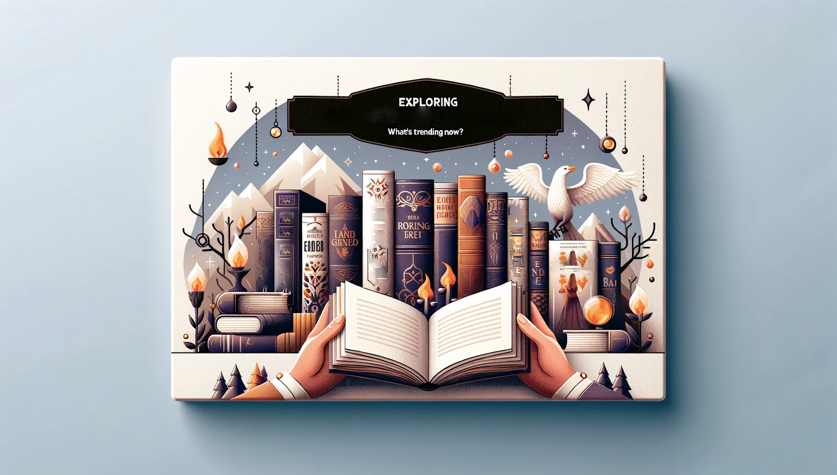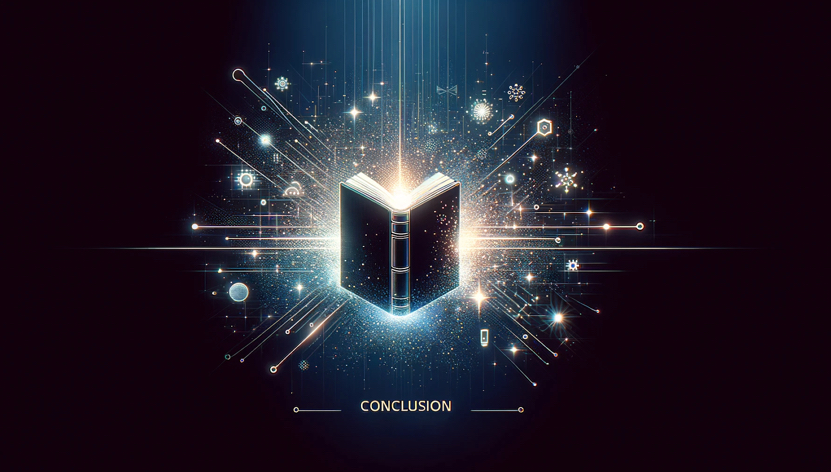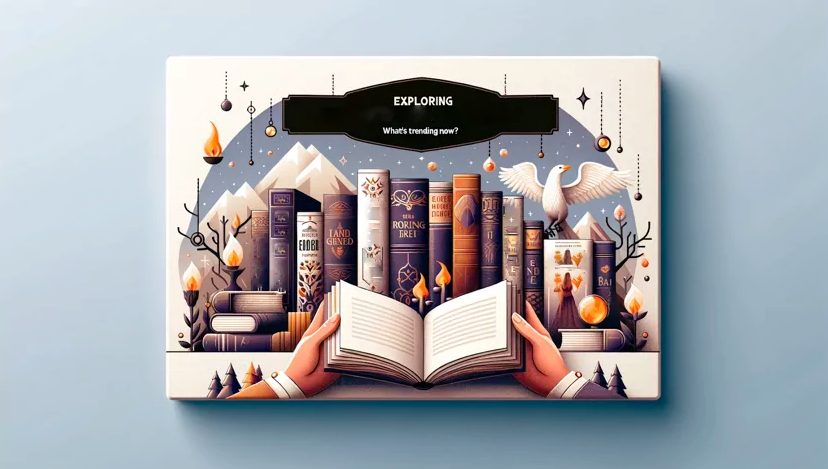In the ever-evolving world of literature, the winds of book genre popularity are constantly shifting, guiding the sails of authors, publishers, and readers toward new horizons. This dynamic landscape is influenced by a myriad of factors, from societal changes and technological advancements to the ebb and flow of cultural interests. Understanding these trends is crucial for industry insiders and literature enthusiasts alike, as it not only dictates the market’s supply and demand but also reflects the collective psyche of readers worldwide.
For authors especially, understanding genre popularity is crucial for book writing – it can mean the difference between a bestseller and a bookshelf dweller. For publishers, it’s the key to strategic marketing and distribution; and for readers, it offers a signpost, pointing toward their next great adventure in reading.
As we delve into the current trends in book genres, we uncover not just the preferences of the reading public but also the changing narrative of our times, highlighting the most popular book genres that have captured the imagination and hearts of readers across the globe.

The Ever-Evolving Literary Landscape
The literary landscape is a mirror reflecting the shifting sands of time, with genre popularity serving as a testament to the dynamic interplay between society and storytelling. Historically, popular genre trends have ebbed and flowed in response to the zeitgeist of their eras. For instance, the Romantic period of the early 19th century, with its emphasis on emotion and individualism, gave rise to gothic and romantic literature. Contrastingly, the post-war 20th century saw a surge in existentialist literature and noir, mirroring the disillusionment and questioning of traditional values prevalent at the time.
Your Publishing Journey Awaits – Start NowThe Forces Behind Literary Trends
Several factors contribute to these shifts in book sales and genre popularity. Cultural changes, such as the evolving roles of gender and the growing awareness of social issues, often find their expression in the themes and characters of contemporary literature, pushing certain genres to the forefront. Global events, including wars, economic downturns, and pandemics, also significantly impact literary trends, as readers seek both escapism and understanding through the lens of fiction and non-fiction.
In recent decades, technological advancements have played a pivotal role in shaping the literary landscape. The advent of digital publishing has democratized the field of literature, allowing niche genres to find their audience and enabling authors to bypass traditional publishing gateways. Social media platforms and online communities have further transformed the discovery process, allowing readers to share recommendations and reviews, thus propelling certain popular genres to viral status.
This digital era has facilitated a global conversation about books, transcending geographical barriers and introducing readers to diverse genres they might not have encountered otherwise. From the rise of e-books to the advent of audiobooks, technology continues to redefine how, where, and what people read, ensuring the literary landscape remains as dynamic and varied as the readers it serves.
Romance Novels: A Timeless Favorite
The romance genre, with its tales of love, passion, and happy endings, has long stood as a cornerstone of the literary world, boasting an enduring appeal that transcends time and trends. At its heart, the genre speaks to the universal human experience of love and the pursuit of emotional connection, themes that resonate deeply with readers across the globe. This timeless allure is further enriched by the genre’s ability to evolve and diversify, presenting love stories in a myriad of settings, from the drawing rooms of historical romances to the far-flung worlds of paranormal love tales.
Within the romance umbrella, a rich tapestry of different genres and sub-genres flourishes, offering something for every reader’s taste. Historical romance whisks readers away to bygone eras, where they can immerse themselves in the intricacies of period-specific customs and costumes, all while following the trials and tribulations of lovers separated by societal norms. Contemporary romance, on the other hand, reflects the here and now, addressing modern-day challenges and joys of love in a relatable setting. For those with a taste for the mysterious and otherworldly, paranormal romance blends elements of fantasy and supernatural to explore romantic entanglements that defy the ordinary, involving creatures and lore from beyond the human realm.
The advent of digital platforms and the rise of self-publishing have significantly bolstered the romance genre’s popularity, breaking down the barriers to entry for new authors and providing them with direct access to their audience. E-books and online retailing have made romance novels more accessible than ever, allowing readers to discreetly and conveniently indulge in their favorite stories. Social media and dedicated online communities have fostered a vibrant, interactive space for romance enthusiasts to share recommendations, reviews, and fan fiction, further nurturing the genre’s growth.
This digital revolution has not only democratized the world of romance publishing but also empowered authors to experiment with new sub-genres and themes, ensuring the everlasting appeal of romance novels in the literary landscape.
Science Fiction: Imagining the Future
Science fiction serves as a canvas for humanity’s most imaginative musings about the future, blending scientific principles with visionary storytelling to explore what lies beyond the realm of current possibility. This genre appeals to readers’ innate curiosity and desire to understand the unknown, presenting a speculative view of future societies, technological advancements, and the ethical dilemmas they may entail. By pushing the boundaries of imagination, science fiction allows us to ponder the potential consequences of our technological and scientific pursuits, offering a blend of escapism and insightful commentary on the human condition.
Visionaries of the Void: Architects of Science Fiction
The channels of science fiction are graced by luminaries who have significantly shaped the genre with their groundbreaking works. Authors like Isaac Asimov, with his “Foundation” series, envisioned vast galactic empires governed by the laws of psychohistory, blending hard science with complex societal dynamics. Arthur C. Clarke’s “2001: A Space Odyssey” combined scientific accuracy with philosophical musings, setting a benchmark for the genre’s narrative depth. Contemporary authors like Neal Stephenson and Margaret Atwood have continued this tradition, exploring themes of cybernetics, dystopia, and bioengineering, pushing the genre’s boundaries further into the realms of possibility.
Science fiction’s portrayal of future technologies and societies has had a profound influence on real-world technology and societal outlooks. Innovations once confined to the pages of sci-fi novels, such as virtual reality, space travel, and artificial intelligence, have increasingly become topics of serious research and development. The genre encourages scientists, engineers, and policymakers to think creatively and critically about the potential ramifications of advancements, fostering a forward-thinking culture that anticipates and addresses the ethical, moral, and practical challenges of future innovations.
Moreover, by presenting scenarios laden with cautionary tales and optimistic forecasts, science fiction shapes our collective expectations and aspirations for the future, embedding a sense of responsibility toward shaping a world that mirrors our highest ideals and most profound hopes.
Your Publishing Journey Awaits – Start NowFantasy Genre: Beyond Reality
The fantasy genre is defined by its departure from the mundane, inviting readers into realms where magic is real, mythical creatures roam, and epic quests await. Central to fantasy is the concept of world-building; authors meticulously craft intricate universes governed by their own set of rules, histories, and mythologies. This genre’s core appeal lies in its ability to offer complete immersion in an otherworldly experience, providing an escape from the confines of reality while exploring themes of heroism, power, and the struggle between good and evil.
Fantastical Waves: The Renaissance of the Fantasy Genre
The fantasy genre experienced a significant resurgence in mainstream popularity with the advent of J.K. Rowling’s “Harry Potter” series and J.R.R. Tolkien’s “The Lord of the Rings.” These series not only captivated millions of readers worldwide but also became cultural phenomena, transcending the literary world to influence film, television, and even academic studies. “Harry Potter” introduced a generation to the joys of reading, weaving a magical tapestry rich with themes of friendship, courage, and the complexities of growing up. “The Lord of the Rings,” with its deep lore and epic scope, set a benchmark for high fantasy, inspiring countless authors and creators to explore the intricacies of their imagined worlds.
The broad canopy of the fantasy genre shelters a multitude of sub-genres, each with its dedicated fan base. High fantasy, characterized by its epic scale and set in entirely fictional worlds, stands alongside urban fantasy, a preferred genre that melds magical elements with contemporary settings. Dark fantasy delves into the more sinister aspects of the magical world, while historical fantasy reimagines the past with a magical twist. Each sub-genre offers a unique lens through which to explore complex themes and narratives, contributing to the genre’s growth and diversification. This evolution of fantasy sub-genres has fostered a rich, vibrant community of readers and writers, continually pushing the boundaries of the imagination and ensuring the genre’s enduring appeal and relevance.
Young Adult Fiction: More Than Just a Phase
Young Adult (YA) fiction has burgeoned into a formidable category within the publishing world, shedding its erstwhile niche status to become a leading literary force. This genre’s ascendancy is marked by its profound ability to resonate with the tumultuous phase of adolescence, addressing the myriad challenges, triumphs, and tribulations that define the transition from youth to adulthood for young adults. YA fiction serves as both a mirror and a window for young readers, reflecting their own experiences while offering perspectives on a world that extends beyond their immediate surroundings.
Echoes of Youth: The Universal Resonance of YA Fiction
YA novels delve into a spectrum of themes that speak directly to the concerns and interests of young readers. Identity, belonging, love, loss, and the quest for self-discovery are recurring motifs, rendered in narratives that range from the heartbreakingly realistic to the wildly fantastical. Issues such as mental health, social justice, and the complexities of family and relationships are explored with authenticity and sensitivity, fostering empathy and understanding among readers. The genre’s willingness to tackle difficult subjects head-on, without patronizing its audience, has cemented its relevance and appeal to the youth.
Remarkably, YA fiction’s allure is not confined to its target demographic; it boasts a significant crossover appeal, enchanting adult readers in equal measure. This can be attributed to the universal quality of the themes it explores, as well as the often sophisticated narrative techniques and character developments employed by YA authors. The young adult genre itself has the capacity to capture the intensity of first experiences and the vibrancy of youth which strikes a chord with adults, evoking nostalgia and providing a fresh perspective on the trials and tribulations of growing up. This broad appeal has contributed to the commercial success and cultural impact of YA fiction, establishing it as a vital and dynamic component of the literary landscape.
Genre Fiction vs. Literary Fiction
The literary world often draws a line between genre fiction and literary fiction, categories distinguished not just by their narrative elements but by the perceived depth and artistic merit of their works.
Genre fiction typically adheres to specific conventions of particular genres like romance, science fiction, fantasy, mystery, and horror, providing readers with the comfort of familiar tropes and predictable structures. These works are often plot-driven, focusing on storytelling and entertainment, which contributes to their wide popular appeal.
In contrast, literary fiction is lauded for its emphasis on prose style, character development, and thematic depth, often eschewing the formulaic for the exploratory. These narratives are more likely to probe the human condition, offering nuanced insights into society, psychology, and the complexities of existence. Literary fiction is often regarded as having higher artistic merit, with works in this category frequently recognized by prestigious literary awards and critical acclaim.
Blurring Lines: The Convergence of Genre and Literary Fiction
The debate between the literary merit and popular appeal of these two categories has long stirred the waters of the publishing world. Critics of genre fiction sometimes dismiss it as being of lesser quality or artistic value, while proponents of popular fiction argue that such distinctions unfairly overlook the skill and creativity involved in crafting compelling genre narratives. Moreover, the rise of crossover works has challenged these traditional boundaries, blending the imaginative plots and accessible storytelling of genre fiction with the stylistic and thematic sophistication of literary fiction.
Notable examples of such crossover successes include Margaret Atwood’s “The Handmaid’s Tale,” which merges speculative fiction with profound social commentary, and Kazuo Ishiguro’s “Never Let Me Go,” a science fiction novel with the emotional depth and literary craft typically associated with literary fiction. These works in other genres demonstrate that the distinction between genre and literary fiction is not always clear-cut, highlighting the evolving nature of literature and the infinite possibilities that arise when authors transcend conventional boundaries to explore new narrative territories.
The Rise of Non-Fiction: Educating and Inspiring
In recent years, non-fiction has experienced a significant upsurge in popularity, captivating readers with works that educate, inspire, and provide insight into a myriad of subjects. This rise is marked by an increased appetite for literature that not only informs but also aids in personal growth and understanding of the world. Categories such as self-help, biography, and history have seen particular acclaim, offering readers pathways to self-improvement, windows into the lives of remarkable individuals, and lessons from the past that illuminate the present.
Your Publishing Journey Awaits – Start NowGuides to Growth: The Transformative Power of Non-Fiction
The self-help genre, with its focus on personal development, has become a beacon for those seeking to enhance their lives, whether through better habits, mental health, or professional success. Biographies and memoirs offer a different kind of inspiration, detailing the trials and triumphs of historical figures and contemporary icons alike, providing readers with real-life examples of resilience, creativity, and leadership. History books, on the other hand, satisfy a collective curiosity about our origins and the events that have shaped the modern world, fostering a deeper understanding of societal dynamics and human behavior.
Non-fiction’s role extends beyond mere education; it serves as a tool for navigating the complexities of modern life and the rapid pace of current events. By grounding readers in facts and diverse perspectives, non-fiction fosters informed opinions and critical thinking, vital skills in an era dominated by information overload.
Luminaries of Learning: Trailblazers in Non-Fiction
Among the plethora of works contributing to the genre’s popularity, Yuval Noah Harari’s “Sapiens: A Brief History of Humankind” offers a compelling overview of human evolution, while Michelle Obama’s “Becoming” provides an intimate look at the life of the former First Lady. Jordan Peterson’s “12 Rules for Life” has sparked conversations on self-help and psychology, illustrating the varied interests and needs that non-fiction meets.
These authors, among others, have not only driven the genre’s growth but have also demonstrated the powerful impact of non-fiction in shaping public discourse, personal development, and our understanding of the past and present.
Horror, Thriller, and Mystery: Seeking Suspense
The genres of horror, thriller, and mystery are united by a common thread: the captivating pull of suspense. This trio of genres has long enthralled readers with narratives that teeter on the edge of the known and the unknown, weaving tales that range from the subtly unsettling to the heart-pounding. The enduring appeal of these genres lies in their ability to evoke a primal response—fear, anticipation, curiosity—engaging readers in a psychological dance that mirrors the complexities and anxieties of real life.
Horror fiction, with its dark forays into the macabre and supernatural, taps into our deepest fears, challenging our perceptions of reality and safety. Authors like Stephen King have become synonymous with the genre, masterfully crafting stories that explore the darker aspects of human nature and the lurking horrors of the everyday. In the realm of thrillers, writers such as Gillian Flynn and Lee Child have captivated audiences with tightly wound narratives of suspense and surprise, where danger and deception lie around every corner. Mystery, epitomized by the works of Agatha Christie and Arthur Conan Doyle, presents a cerebral challenge to readers, inviting them into a game of wits as they untangle webs of clues and deception.
Shadows and Suspense: The Psychological Lure of Mystery and Horror
The psychological appeal of these genres lies in their exploration of the unknown and the forbidden. They confront us with the limits of our understanding and control, forcing us to confront our fears and question what lies in the shadows. This exploration often provides a safe space for readers to engage with their anxieties and find catharsis in the resolution of the narrative. Moreover, the suspenseful storytelling of horror, thriller, and mystery fiction books serves as a reflection of societal fears and tensions, making these genres not only a source of entertainment but also a lens through which to view the human psyche and the ever-present dance with the unknown.

Conclusion: The Future of Book Genres
As we look to the future of book genres, it’s clear that the landscape of literature will continue to evolve, shaped by the ever-changing tapestry of cultural and technological influences. We may see a surge in genres that resonate with contemporary concerns, such as climate fiction (cli-fi) addressing environmental issues, and an increased interest in digital and cyber-themed narratives reflecting our growing immersion in technology. Conversely, traditional genres might experience transformations or wane in popularity, giving way to these new frontiers of storytelling.
The potential for new literary genres to emerge is vast, fueled by ongoing global changes and the limitless imagination of writers. Hybrid genres that blend elements of traditional categories could rise, offering fresh perspectives and innovative narratives. The growing influence of global cultures in the literary world may also introduce readers to diverse storytelling traditions, enriching the literary landscape with a tapestry of global voices.
This dynamic future invites readers to venture beyond their comfort zones, exploring new genres and sub-genres to discover untold stories and fresh voices. Embracing this diversity in literature not only enriches our personal reading experiences but also fosters a deeper understanding of the complex world around us. As the pages of the future unfold, readers and writers alike stand on the brink of exciting literary discoveries, promising a vibrant and evolving world of books.
Ready to Publish Your Book?
If you’re ready to share your finished manuscript with readers far and wide, Spines offers the pathway to realizing your publishing dreams. Welcome to the modern age of publishing with Spines, where our AI-driven platform transforms your publishing journey. Our range of services includes meticulous editing, proofreading, designing captivating covers, and seamless distribution, along with strategic marketing across diverse channels and platforms. With Spines, your book is set to break the mold, and soon you’ll embark on your journey to making a living through writing.
Your Publishing Journey Awaits – Start Now







